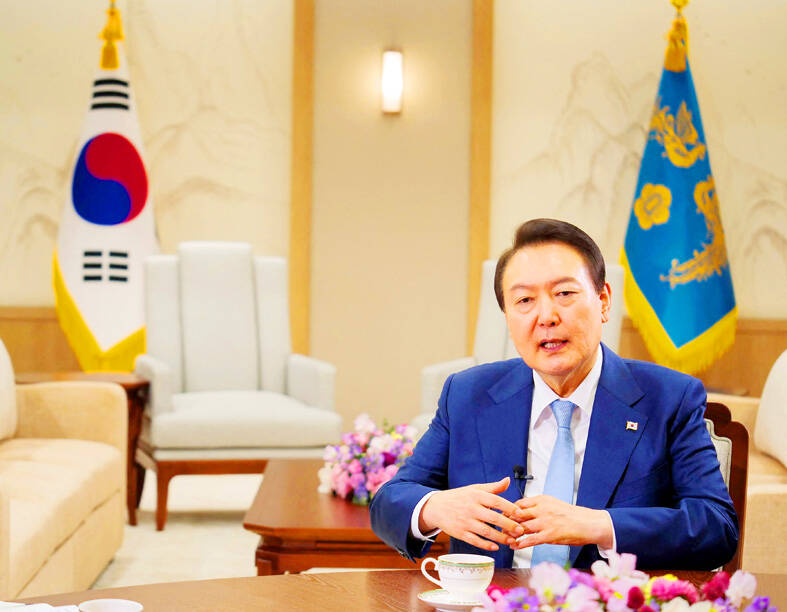South Korea’s parliament on Saturday approved South Korean President Yoon Suk-yeol’s administration’s first full-year budget bill for next year, which cut total spending and the fiscal deficit from this year.
The approved budget, valued at 638.7 trillion won (US$498.89 billion) or 6 percent less than this year’s, is set to cut the fiscal deficit to 0.6 percent of GDP from 3.3 percent this year.
Out of the total, a bulk of 35.4 percent was allocated for public health, welfare and employment programs, followed by 15.1 percent for the education sector and 8.9 percent for national defense spending, according to the South Korean Ministry of Finance.

Photo: Reuters
Yoon has pledged since taking office this year to strengthen government finances, weakened in recent years by increased public spending to expand welfare programs and fight the COVID-19 pandemic.
South Korea’s government debt-to-GDP ratio has steadily risen to an estimated 49.7 percent this year from below 40 percent in 2019 and below 30 percent in 2010 as the country has expanded the welfare system as its population has been aging.
The ratio is set to hold almost steady at 49.8 percent next year.
Yoon’s government aims to contain the debt growth by keeping the fiscal deficit at 0.5 percent to 0.6 percent in each of the next several years, compared with 3.3 percent estimated for this year.
The economy is expected to decelerate next year due to weaker exports and still-elevated interest rates.
The Bank of Korea last month cut its growth forecast for next year to 1.7 percent from a previous 2.6 percent.
The South Korean National Assembly approved a proposed plan to cut the corporate income tax by 1 percentage point for each tax bracket, including cutting the top rate to 24 percent from 25 percent.
The parliament also delayed the introduction of a financial investment income tax by two years.
Additional reporting by Bloomberg

Anna Bhobho, a 31-year-old housewife from rural Zimbabwe, was once a silent observer in her home, excluded from financial and family decisionmaking in the deeply patriarchal society. Today, she is a driver of change in her village, thanks to an electric tricycle she owns. In many parts of rural sub-Saharan Africa, women have long been excluded from mainstream economic activities such as operating public transportation. However, three-wheelers powered by green energy are reversing that trend, offering financial opportunities and a newfound sense of importance. “My husband now looks up to me to take care of a large chunk of expenses,

SECTOR LEADER: TSMC can increase capacity by as much as 20 percent or more in the advanced node part of the foundry market by 2030, an analyst said Taiwan Semiconductor Manufacturing Co (TSMC, 台積電) is expected to lead its peers in the advanced 2-nanometer process technology, despite competition from Samsung Electronics Co and Intel Corp, TrendForce Corp analyst Joanne Chiao (喬安) said. TSMC’s sophisticated products and its large production scale are expected to allow the company to continue dominating the global 2-nanometer process market this year, Chiao said. The world’s largest contract chipmaker is scheduled to begin mass production of chips made on the 2-nanometer process in its Hsinchu fab in the second half of this year. It would also hold a ceremony on Monday next week to

TECH CLUSTER: The US company’s new office is in the Shalun Smart Green Energy Science City, a new AI industry base and cybersecurity hub in southern Taiwan US chip designer Advanced Micro Devices Inc (AMD) yesterday launched an office in Tainan’s Gueiren District (歸仁), marking a significant milestone in the development of southern Taiwan’s artificial intelligence (AI) industry, the Tainan City Government said in a statement. AMD Taiwan general manager Vincent Chern (陳民皓) presided over the opening ceremony for the company’s new office at the Shalun Smart Green Energy Science City (沙崙智慧綠能科學城), a new AI industry base and cybersecurity hub in southern Taiwan. Facilities in the new office include an information processing center, and a research and development (R&D) center, the Tainan Economic Development Bureau said. The Ministry

State-run CPC Corp, Taiwan (CPC, 台灣中油) yesterday signed a letter of intent with Alaska Gasline Development Corp (AGDC), expressing an interest to buy liquefied natural gas (LNG) and invest in the latter’s Alaska LNG project, the Ministry of Economic Affairs said in a statement. Under the agreement, CPC is to participate in the project’s upstream gas investment to secure stable energy resources for Taiwan, the ministry said. The Alaska LNG project is jointly promoted by AGDC and major developer Glenfarne Group LLC, as Alaska plans to export up to 20 million tonnes of LNG annually from 2031. It involves constructing an 1,290km